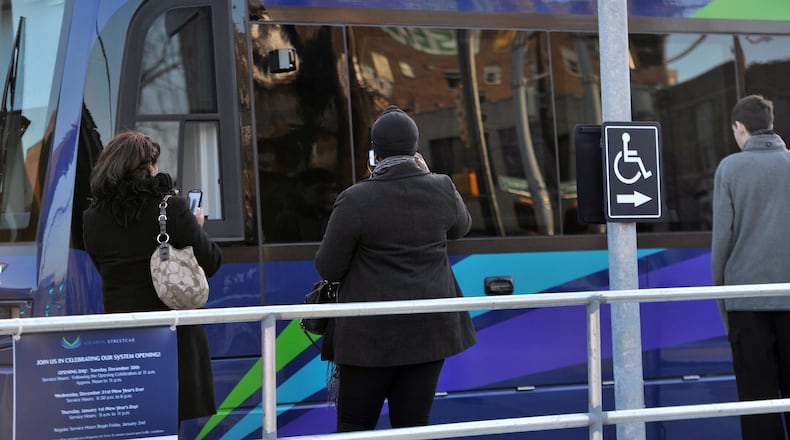I can envision a future, perhaps the year 2030, after the streetcar has been extended 2.5 miles from downtown Atlanta to the east side Beltline and up to the Ponce City Market.
The public is outraged that the hyper-popular stretch of the Beltline flooded by pedestrians and cyclists is now squeezed with dual streetcar tracks and a safety retaining wall.
It will have cost $300 million to build (it’s currently projected at $230 million, which means my $300 million estimate is probably low) and the ridership is nowhere near what the optimistic studies projected.
“Well,” the Beltline rail faithful will say. “The streetcar line doesn’t go far enough. If we build it another four miles north and a couple/three to the south and also go west, and spend, say, a couple of billion dollars more, then we’ll see some improvement. Trust us, you’ve gotta be all in on this. And keep building more.”
And then the mayor and City Council and the MARTA board will be left with a conundrum: Should they continue to spend good money after bad and chase elusive ridership models? Or will they pull the plug on future investment and decide, yep, we gambled and made a bad bet?
Or maybe, just maybe, clear-thinking brains can be transported to the past (which is actually now) and kill off a future boondoggle.
I get it. Just about everyone likes trains and streetcars. There’s a nostalgia to bringing 19th century transportation technology into the 21st century. Brings us back to a simpler, less-rushed time.
If only they would propose horse-drawn carriages.
Earlier this month, several members of the MARTA board held their noses and voted 8-0, with two abstentions, to move the project forward.
Largely, the reasoning went along the lines of “Mayor Andre Dickens wants this and it’s Atlanta’s money, so who are we to stand in the way?”
They were referring to the 2016 “More MARTA” referendum where Atlanta voters approved adding another half-penny to the existing one-penny MARTA sales tax to get some transit projects done. So Atlanta officials get to decide how to spend that fund.
But there’s evidence MARTA officials don’t think the streetcar is a good bet because the agency has not sought federal funds for the project, as they have for other projects. It seems they believe the feds won’t think it’s a good use of U.S. Transportation dollars.
So Atlanta will pay the entire $230 million for the streetcar extension. Or whatever it ends up costing.
Residents living near the plan have concerns but will no doubt be brushed aside by rail supporters as NIMBYs or anti-transit grouches.
Hans Klein, a former city official and current Georgia Tech professor, is part of a loosely aligned group opposing the plan. He told the board that turning the Beltline into a “construction zone” would be unpopular with the path’s many users.
Later, in an interview, Klein referred to the existing downtown streetcar, saying, “They have a turkey and now they’ll need to make it twice as long.”
Perhaps more money will turn it into a swan, or whichever bird is better than a turkey.
“This has been thought out politically,” Klein added, “but not economically or even rationally. The idea is that transit is nice. It’s visible. It’ll be positive. But it’s not vetted because the feds are not involved looking over their shoulder. The feds hit them hard on the (downtown) streetcar. They can force a rational planning process.”
Or perhaps the feds aren’t the arbiter of all that is sensible. They footed the bill for much of the downtown street car.
One of the abstentions on the MARTA board vote was Jim Durrett, who heads both the Buckhead Coalition and Buckhead Community Improvement District (CID).
“I believe it’s a mistake to extend the streetcar to the Beltline,” he said. But, he added, out of respect for the mayor’s wishes he was not going to stand in the way.
Bill Floyd, the former mayor of Decatur, said, “I have some issues with this” but added, “it’s an Atlanta issue” and “it’s their money.”
He said the public needs to be shown what the double-tracked streetcar on the popular linear park will look like.
“There needs to be some point along this way where we can say, ‘Holy crap! That’s not what we thought this would be,’” Floyd said. “There need to be some points where we can reconsider or where Atlanta can reconsider what we are getting into. The dye is not cast.”
Then he voted ”Yes.”
Even Dickens’ choice on the board, former Atlanta Councilwoman Jennifer Ide, was somewhat blah in her support. “It doesn’t mean transit on the Beltline is being decided today,” she said. “This is one section that made sense with the city to move forward.”
But, she added, “there needs to be a lot more discussion about what happens with the rest of the Beltline, transit or no transit.”
Overall, that discussion has been largely brushed aside. The idea came about with the creation of the Beltline vision a couple decades ago and has become some kind of holy urbanism credo.
It just hasn’t been challenged by any rational skepticism.
About the Author
Keep Reading
The Latest
Featured





